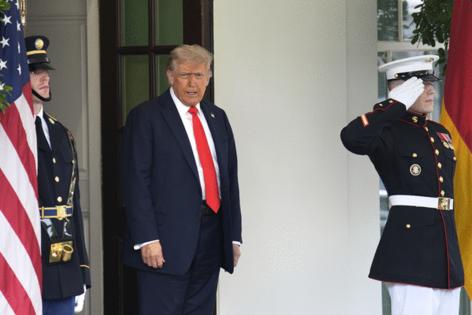Minnesota group calls Trump travel ban 'cruel' as they assess its impact on state
Published in Political News
Minnesota advocacy groups and lawmakers are reacting to President Donald Trump’s latest travel ban with condemnation and concern as they work to assess its impact.
Trump has imposed a travel ban on 12 countries and put harsh restrictions on seven others. The new executive order forbids citizens of Afghanistan, Myanmar, Chad, the Republic of the Congo, Equatorial Guinea, Eritrea, Haiti, Iran, Libya, Somalia, Sudan and Yemen from traveling to the United States. Trump, citing national security risks in an executive order, with the restrictions going into effect Monday.
Minnesota U.S. Rep. Ilhan Omar, who was born in Somalia and was one of the first Muslim women elected to Congress, denounced the ban on social media.
“This discriminatory policy is beyond shameful. Just like his first Muslim Ban, this latest announcement flies in the face of basic morality and goes directly against our values,” she wrote on X. “This racist policy will not make us safe, it will separate families and endanger lives. We cannot let it stand.”
Jaylani Hussein, executive director of the Minnesota chapter of the Council on American-Islamic Relations, said he anticipated Trump’s action.
“We are calling it the Muslim and African ban, and it will have a significant impact on Minnesota,” he said. “It is cruel. It is racist. And it is absolutely inconsistent with the American values of liberty, equality and human dignity.”
Trump’s executive order also “partially restricts and limits the entry of nationals” with certain visas from Burundi, Cuba, Laos, Sierra Leone, Togo, Turkmenistan, and Venezuela.
The White House’s announcement of the restrictions said that “Laos has historically failed to accept back its removable nationals.”
In 2018, the Minnesota State Demographic Center estimated that about 24,400 Minnesotans were born in Laos.
Minnesota U.S. Rep. Betty McCollum also called out Trump’s focus on Laos, saying he ‘’betrays our American values’' by restricting travel from countries “he doesn’t like.’'
Hussein said he’s still trying to understand the wide-ranging impacts, but said the ban targets students, families fleeing violence, workers helping push the U.S. economy forward and people seeking safety and new opportunities.
“Families will be torn apart. Dreams will be delayed or denied. The trauma, fear and confusion this ban creates is the point — and we refuse to accept it," he said.
“These communities are not threats. They are Minnesotans. And they belong here,” he added.
Hussein said he expects there will be legal challenges. He said CAIR-MN plans to hold a press conference Monday to talk more about the travel ban and its impact.
The naming of Venezuela as “high risk” is another worrisome development, said Andrew Deziel, founder and board member with the newly formed nonprofit Case de Venezuela Minnesota. The ban comes after the Trump administration in May removed Temporary Protected Status for Venezuelans.
A Twin Cities-area Venezuelan softball league has called off this weekend’s games because of fear Immigration and Customs Enforcement (ICE) officials may show up to a large event.
“It is worrying for all of us,” Deziel said. “Scary.”
More than 350 people have signed a petition urging Congress to pass legislation to protect Venezuelans and provide a path for them to gain legal permanent residency, he said.
Trump, in a video posted on his Truth Social account, said an attack last weekend in Colorado carried out by man with ties to Egypt “underscored the extreme dangers” posed by foreign nationals who had not been “properly vetted,” and that the ban would protect America from “dangerous foreign actors.”
However, Egypt is not on Trump’s list of 19 nations slapped with travel restrictions.
“Why isn’t Egypt on there?” Hussein asked. “It is concerning that this (the incident in Colorado) was the reason this was fast-tracked.”
Minnesota Compass reports that an estimated 82,436 Somali Americans live in Minnesota, giving it the largest Somali population in the United States.
This is the second time Trump has ordered a ban on travel from certain countries. He signed a similar order in 2017 during his first term.
_____
©2025 The Minnesota Star Tribune. Visit startribune.com. Distributed by Tribune Content Agency, LLC

























































Comments